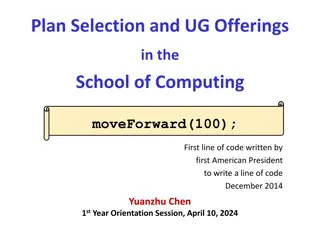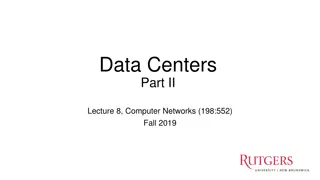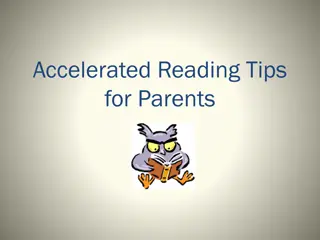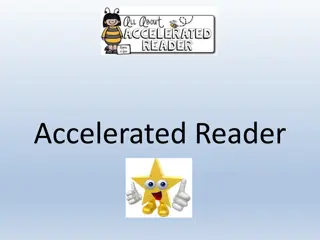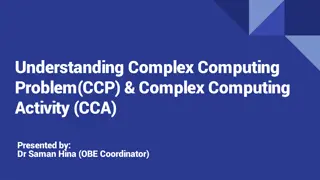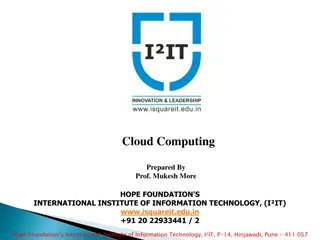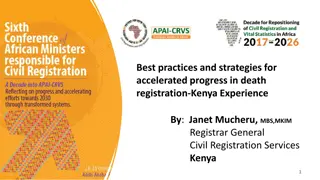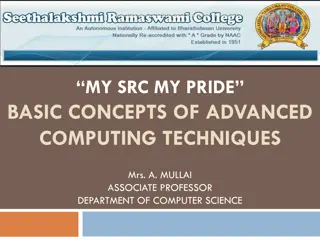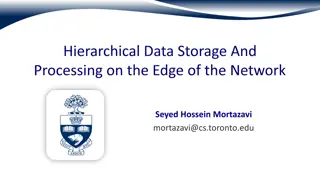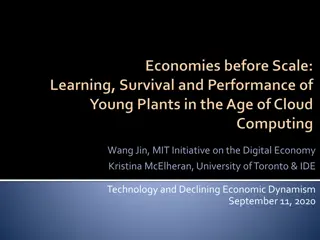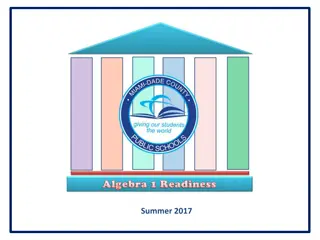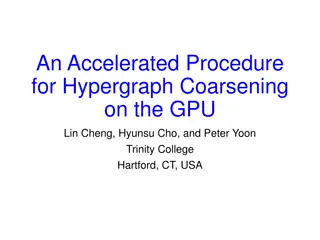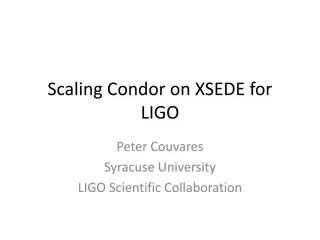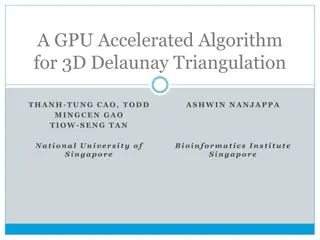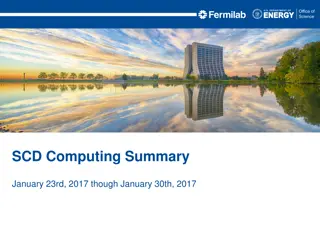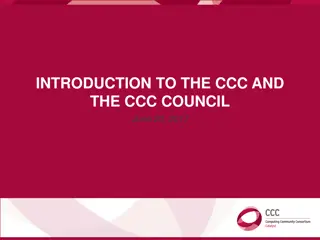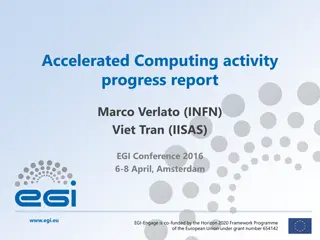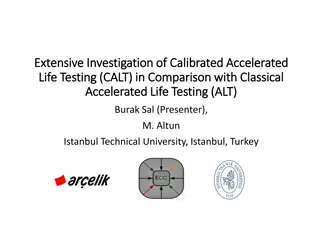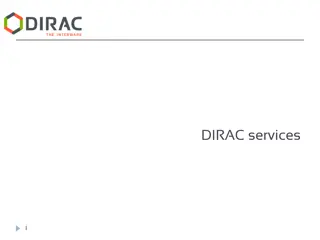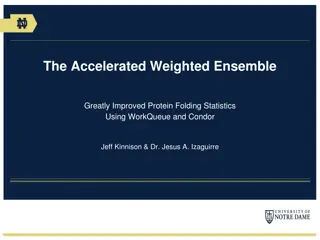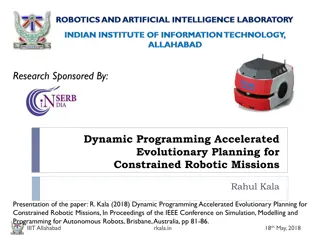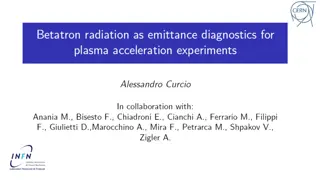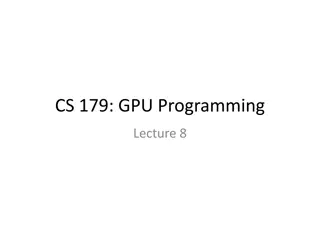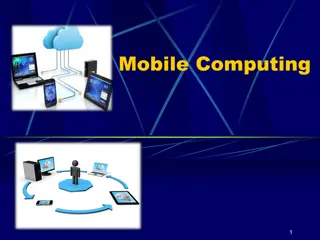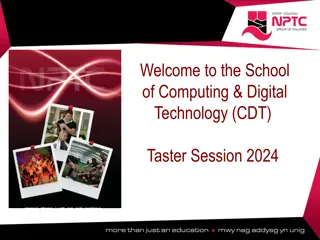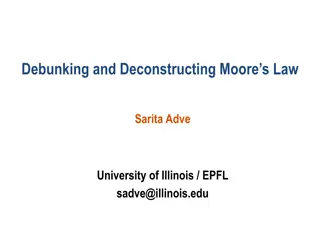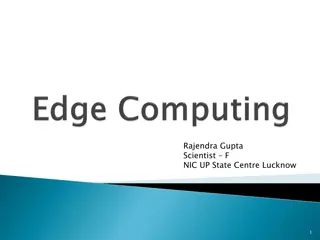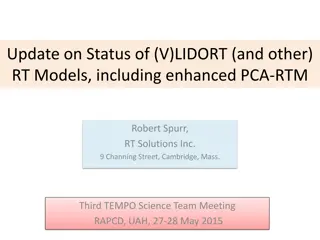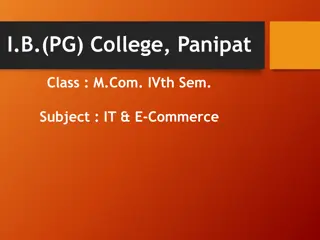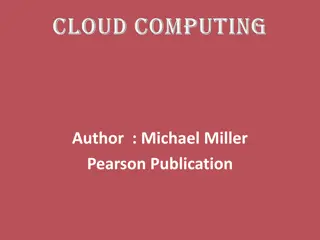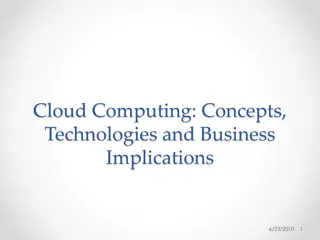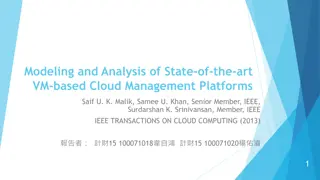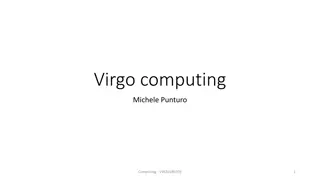Accelerated Preceptorship: Developing Yourself
Explore accelerated preceptorship by understanding the importance of self-development in personal, professional, and clinical aspects. Delve into SLOT analysis, learning cycles, and reflective tools to identify and prioritize learning needs. Enhance your skills and competence through self-awareness
0 views • 29 slides
Computing Degree Plans and Offerings at School of Computing
Explore the diverse degree plans and offerings at the School of Computing, including Honours and General degrees, minors, and certificates in Data Analytics. Plan selection is crucial for advancing to second-year courses, with automatic acceptance and pending list options available. Discover the var
0 views • 20 slides
Understanding Data Centers and Cloud Computing Technologies
Explore the world of data centers and cloud computing through topics such as data center functionalities, cloud computing advantages, challenges in Data-Center Networks (DCNs), cost breakdowns, server utilization considerations, and more. Delve into the intricacies of managing large-scale computing
0 views • 20 slides
Effective Tips for Supporting Your Child's Accelerated Reading (A.R.) Program
Accelerated Reading (A.R.) is a computerized program designed to enhance children's reading skills through practice and comprehension tests. To help your child at home, engage in daily reading sessions, conduct book talks, and provide guidance during Accelerated Reader testing. Encouraging a variety
1 views • 7 slides
Understanding Parallel and Distributed Computing Systems
In parallel computing, processing elements collaborate to solve problems, while distributed systems appear as a single coherent system to users, made up of independent computers. Contemporary computing systems like mobile devices, IoT devices, and high-end gaming computers incorporate parallel and d
1 views • 11 slides
Accelerated Reader Program Guide for Parents
The Accelerated Reader program is designed for children in Years 3 to 6 to find appropriate reading materials, encourage reading, and improve reading ability. Students take the STAR test at the beginning of the year to determine their ZPD score, which guides their book selection. Regular STAR tests
1 views • 7 slides
Understanding Complex Computing Problem (CCP) and Complex Computing Activity (CCA)
Dr. Saman Hina, along with Dr. Farrukh Arif and Dr. Maria Waqas, presents information on Complex Computing Problem (CCP) - a problem involving technical, computing, and other issues with no obvious solution, requiring deep knowledge and analytical thinking. CCP is evaluated through predefined rubric
4 views • 19 slides
Understanding Cloud Computing and Its Components
Cloud computing, offered by the Hope Foundation's International Institute of Information Technology, is Internet-based computing that involves remote servers sharing data-processing tasks and resources. Users can access software without local hardware requirements, empowering them with agility and e
0 views • 15 slides
Strategies for Accelerated Death Registration in Kenya: Insights from Janet Mucheru
The Civil Registration Services in Kenya faces challenges in death registration, but through lessons learned, best practices are recommended for accelerated progress. The department's core functions, purpose of civil registration, and death registration processes in Kenya are outlined, shedding ligh
3 views • 12 slides
Exploring Basic Concepts of Advanced Computing Techniques
Delve into the world of advanced computing techniques with Mrs. A. Mullai as she discusses networks, computing, and pervasive (ubiquitous) computing. Discover how networks facilitate data exchange, the role of computing in designing hardware and software systems, and the trend of embedding computati
2 views • 40 slides
Exploring Emerging Technologies in Cloud Computing
Cloud computing revolutionizes accessibility to computing resources through shared pools. Next-generation applications, edge computing, and web applications on the cloud are shaping the future. CloudPath offers a platform for executing third-party applications across distributed data centers. Real-w
0 views • 16 slides
Understanding Cloud Computing, Edge Computing, and Their Applications
Cloud computing entails centralized processing of data on powerful servers, offering scalable resources over the internet. Edge computing brings processing closer to data generation points, reducing latency and enhancing security. Both paradigms cater to different needs such as IoT, autonomous vehic
0 views • 18 slides
Exploring Orto-Computing: Bridging the Gap Between Formal and Phenomenological Computing
Meaningful experiments suggest a transition from the formal, Turing-based approach to a structural-phenomenological one called Orto-Computing. This innovative concept integrates mind-matter interaction and non-formal functions within computational systems, offering potential solutions to complexity
0 views • 18 slides
Impact of Cloud Computing Technology on Young Firms' Performance
The technology shock of cloud computing has significantly influenced the survival and performance of young firms. Young firms face higher uncertainty, benefit from experimentation, and are resource-constrained, making cloud computing's elastic, fast, and generic nature particularly advantageous. Thi
0 views • 21 slides
Algebra 1 Honors Readiness and Accelerated Student Path Overview
Understand the importance of Algebra 1 Honors preparation, required concepts, and graduation criteria. Dive into the accelerated student path standards post 6th grade. Topics include fractions, equations, proportions, statistics, and probability. Ensure readiness for a successful Algebra 1 journey.
1 views • 19 slides
Accelerated Hypergraph Coarsening Procedure on GPU
An accelerated procedure for hypergraph coarsening on the GPU, presented by Lin Cheng, Hyunsu Cho, and Peter Yoon from Trinity College, Hartford, CT, USA. The research covers hypergraph coarsening, implementation challenges, runtime task planning, hypergraph nodes, hypergraph partitioning, image cla
0 views • 38 slides
Scaling Condor on XSEDE for LIGO - Collaborative Computing Project
The project aims to evaluate the utilization of XSEDE resources by LIGO for large-scale computing tasks, with a focus on distributed computing challenges and fostering a research computing community. Various aspects such as political, cultural, and technical narratives surrounding the collaboration
0 views • 28 slides
GPU Accelerated Algorithm for 3D Delaunay Triangulation
Thanh-Tung Cao, Todd Mingcen Gao, Tiow-Seng Tan, and Ashwin Nanjappa from the National University of Singapore's Bioinformatics Institute present a GPU-accelerated algorithm for 3D Delaunay triangulation. Their work explores the background, related works, algorithm implementation, and results of thi
0 views • 24 slides
Summary of SCD Computing Metrics and Scientific Computing for January 23rd - January 30th, 2017
This summary covers a range of topics related to scientific computing metrics and SCD computing services from January 23rd to January 30th, 2017. It includes details on service areas, offerings, job operations, resource provisioning, database management, system monitoring, and more. The summary also
0 views • 5 slides
Overview of the Computing Community Consortium
The Computing Community Consortium (CCC) was established in 2006 under the Computing Research Association (CRA) to develop a vision for computing research and communicate it to stakeholders. It aims to align computing research with national priorities, encourage high-impact research, and groom new l
0 views • 48 slides
Accelerated Computing Activity Progress Report at EGI Conference 2016
This report outlines the progress made in implementing a new accelerated computing platform as part of the EGI-Engage JRA2 project. The project aimed to support GPGPU integration in batch systems and disciplines like structural biology and molecular dynamics. Key performance indicators and work plan
0 views • 20 slides
Comparative Analysis of ALT and CALT Methods in Accelerated Life Testing
This study presents an extensive investigation comparing Calibrated Accelerated Life Testing (CALT) with Classical Accelerated Life Testing (ALT) methods. It explores the use of 6 samples in CALT versus 100 samples in ALT, emphasizing the advantages of CALT in terms of sample size and efficiency. Th
0 views • 20 slides
Advanced Cloud Computing Solutions with DIRAC Services
Explore advanced cloud computing solutions offered by DIRAC services at IN2P3, including maintenance, operation, VM scheduling, and contextualization. Learn about dynamic VM spawning, cloud endpoint abstraction, and virtual machine monitoring for efficient resource allocation. Stay updated on the la
0 views • 15 slides
Introduction to Mobile Computing Principles and Designing Mobile Applications
Mobile computing systems involve computing capabilities that can be utilized while on the move, leveraging wireless connectivity, small size, and mobile-specific functionalities. The history of mobile computing traces back to military origins and has evolved with technologies like GPS and wireless t
0 views • 98 slides
Introduction to Boston University's Shared Computing Cluster
Boston University's Shared Computing Cluster (SCC) provides researchers with access to a high-performance computing environment for running code, collaborating on shared data, and utilizing specialized software packages. With over 800 nodes, 20,000 processors, and hundreds of GPUs, the SCC offers re
0 views • 63 slides
Accelerated Weighted Ensemble for Improved Protein Folding Statistics
The Accelerated Weighted Ensemble (AWE) approach addresses the challenges faced by traditional molecular dynamics (MD) simulations in generating statistically significant kinetic data for protein folding. By utilizing methods such as WorkQueue and Condor, AWE enhances efficiency and accuracy in stud
0 views • 14 slides
Accelerated Evolutionary Planning for Constrained Robotic Missions: A Dynamic Programming Approach
This research paper by Rahul Kala presented at the IEEE Conference on Simulation, Modelling, and Programming for Autonomous Robots introduces a novel method combining dynamic programming and accelerated evolutionary planning for efficient robotic mission planning. The paper discusses various example
0 views • 19 slides
Overview of Task Computing in Parallel and Distributed Systems
Task computing in parallel and distributed systems involves organizing applications into a collection of tasks that can be executed in a remote environment. Tasks are individual units of code that produce output files and may require input files for execution. Middleware operations coordinate task e
0 views • 17 slides
Plasma Acceleration and Betatron Oscillations Beam Characterization Method
The method for evaluating the quality of beams accelerated through plasma acceleration and betatron oscillations involves non-intercepting diagnostics to infer information about the electrons while inside the accelerating structure. It includes measuring the rms emittance and correcting the betatron
0 views • 12 slides
Understanding GPU-Accelerated Fast Fourier Transform
Today's lecture delves into the realm of GPU-accelerated Fast Fourier Transform (cuFFT), exploring the frequency content present in signals, Discrete Fourier Transform (DFT) formulations, roots of unity, and an alternative approach for DFT calculation. The lecture showcases the efficiency of GPU-bas
0 views • 40 slides
Exploring the World of Mobile Computing
Delve into the realm of mobile computing through this comprehensive presentation outline. Discover what mobile computing is, its applications, challenges, and the future of this technology. Compare mobile networks to wired networks, understand why going mobile is essential, and explore various types
0 views • 106 slides
Explore Computing and Digital Technology Courses at CDT
Discover a range of courses offered by the School of Computing & Digital Technology (CDT) in 4 different colleges. From A-Level Computing to Level 3 Extended National Diploma in IT, the programs provide a blend of theoretical knowledge and practical skills to prepare students for various career path
0 views • 12 slides
Exploring the Evolution and Future of Computing: Moore's Law Debunked
Dive into the critical analysis of Moore's Law and Dennard Scaling by Sarita Adve from the University of Illinois, uncovering the shift towards a new era focused on doing more with less in computing hardware and software abstraction. Discover the concept of "Less Law of Computing" and the emphasis o
0 views • 7 slides
Understanding Edge Computing for Optimizing Internet Devices
Edge computing brings computing closer to the data source, minimizing communication distances between client and server for reduced latency and bandwidth usage. Distributed in device nodes, edge computing optimizes processing in smart devices instead of centralized cloud environments, enhancing data
0 views • 32 slides
Overview of V*LIDORT and Other Radiative Transfer Models by Robert Spurr
The presentation provides an update on the status of V*LIDORT and other radiative transfer models as discussed at the Third TEMPO Science Team Meeting. It covers the LIDORT family overview, upgrades to the codes, new releases for RT models, and accelerated RT developments using PCA. The V*LIDORT cod
0 views • 12 slides
Understanding Cloud Computing in IT & E-Commerce for M.Com IVth Sem Students at I.B. PG College, Panipat
Cloud computing is a revolutionary internet-based computing model that provides shared resources, software, and information on demand. This paradigm shift allows users to access services without the need for expertise in technology infrastructure, offering benefits like scalability, cost-efficiency,
0 views • 16 slides
Introduction to Cloud Computing: A Comprehensive Overview
Cloud computing, a transformative technology, enables easy access to applications and data from anywhere in the world, promoting collaboration and efficiency. This chapter delves into the fundamentals of cloud computing, distinguishing it from traditional desktop computing and network computing. Und
0 views • 32 slides
Overview of Cloud Computing Technologies and Business Implications
Explore the concepts, technologies, and business implications of cloud computing through a discussion on multi-core processors, virtualization, cloud service models (IaaS, PaaS, SaaS), data processing models like MapReduce, and real-world case studies. Learn about the evolution of internet computing
0 views • 18 slides
State-of-the-art Analysis of VM-based Cloud Management Platforms
This study delves into the modeling and analysis of cutting-edge VM-based cloud management platforms, exploring topics such as cloud computing, cloud structure, types of cloud computing, key features of cloud computing, and examples from the cloud computing industry. It discusses Infrastructure as a
0 views • 40 slides
Overview of Virgo Computing Activities
Virgo computing has been a hot topic recently, with various discussions and meetings focusing on computing issues, future developments in astroparticle computing, and funding for INFN experiments. The activities include presentations, committee meetings, talks, and challenges in computing faced by V
0 views • 34 slides

